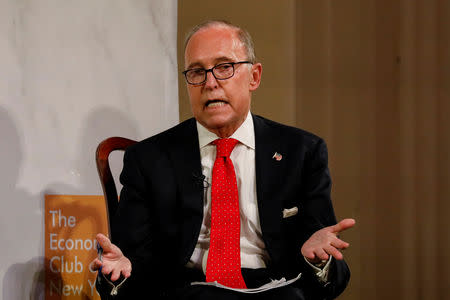Esquire
President Good Brain’s Latest Genius Idea: Build the Wall…Across the Sahara Desert
You like that one? How about Silent Bombs?
By Jack Holmes September 20, 2018
 Getty ImagesAlex Wong.
Getty ImagesAlex Wong.
President Trump’s nominee to the Supreme Court, Brett Kavanaugh, is soaking up all the headlines at the moment, and with good reason. It’s not just that Dr. Christine Blasey Ford has accused Kavanaugh of sexual assault when they were teenagers. Kavanaugh also has a Totally Normal financial background that has largely gone unexplored, and there’s reason to believe he may have lied under oath on multiple occasions while testifying before Congress.
But while all that and Hurricane Florence have been percolating in The Discourse, we’ve learned a little bit more about how our Large, Adult President’s very good brain works. It’s worth pausing to digest a few of his new ideas—or at least the ones we’ve recently learned about. After all, it’s always nice to be reminded that the world’s most powerful man is swimming in a mental sea of informational flotsam. Most of what you might otherwise call his knowledge consists of fragments of reality he internalized around 1982. Those fact-like objects have been fermenting there ever since, re-filtering through his kaleidoscopic reasoning faculties each time he dispensed a crank observation at cocktail party.
Now, of course, he’s the president. Here are some of the things he thinks.
Build the Wall (in the Sahara)
President Trump recommended building a wall across the Sahara to solve Europe’s migrant crisis, Spain’s foreign minister says. Josep Borrell, also a former President of the European Parliament, disagreed with the strategy.
You don’t say. I can’t believe the Spaniards didn’t bite on you should build a 3,000-mile wall, at incredible expense, through one of Earth’s most extreme environments. “The border with the Sahara cannot be bigger than our border with Mexico,” Trump reportedly told the minister, a statement that has the downside of being verifiably false. (The U.S.-Mexico border is less than 2,000 miles.) Of course, Trump doesn’t think in those terms. Reality can be molded to suit his needs and wants, and besides, if he doesn’t know something it’s probably unknowable. It can’t possibly be bigger, he suggests, and more to the point, how could we possibly know?
Spain has no sovereignty over the Sahara, but it does possess two small enclaves on the north African coast, Ceuta and Melilla, separated from Morocco by controversial wire fences. The enclaves have become magnets for African migrants seeking a better life in Europe.
Funny enough, the proposal shares a lot in common with the proposed Wall on our southern border. There are issues with Native American sovereignty, there is already a fence in some areas, and, of course, it won’t actually fix the problem.
Silent Bombs
When the agency’s head of drone operations explained how the CIA had developed special munitions to limit civilian casualties, the president seemed nonplused. Shown a strike in which the CIA delayed firing until the target was a safe distance from a compound with other occupants, Trump asked, “Why did you wait?” And when Trump noticed that militants had scattered seconds before another drone attack, he said, “Can they hear the bombs coming? We should make the bombs silent so they can’t get away.”
It obviously jumps out that our president thinks this is how, well, bombs work. But the more pressing issue is his absolute commitment to racking up civilian casualties. We’ve discussed before his inability to empathize with other human beings, but this seems to be on another level. It’s particularly reassuring when Trump has reopened the CIA’s lethal drone program—missions were shifted exclusively to the military towards the end of the Obama years after criticism of its secrecy and civilian casualties—and we’re now apparently running drones over large parts of Africa, too.
“Just Run the Presses”
As a candidate, Donald Trump pledged to balance the federal budget and lower the national debt, promises that are proving difficult to keep. Once he won, Trump considered an unusual approach that was quickly slapped down by his chief economic advisor…
“Just run the presses — print money,” Trump said, according to Woodward, during a discussion on the national debt with Gary Cohn, former director of the White House National Economic Council.
“You don’t get to do it that way,” Cohn said, according to Woodward. “We have huge deficits and they matter. The government doesn’t keep a balance sheet like that.”
Cohn was “astounded at Trump’s lack of basic understanding,” Woodward writes.
He honestly thought you could just print the $20 trillion and wipe out the debt.
Take his discussion with Cohn on trade:
“Several times [chief economic adviser Gary] Cohn just asked the president, ‘Why do you have these views [on trade]?’ ‘I just do,’ Trump replied. ‘I’ve had these views for 30 years.’ ‘That doesn’t mean they’re right,’ Cohn said. ‘I had the view for 15 years I could play professional football. It doesn’t mean I was right.'”
The president’s views on trade are his views because they’ve been his views for 30 years. They’re right because they’re his views and always have been. There’s no need to learn anything when you already know it all—and you know you know it all because you know what you know. God help us.








![Donald J. Trump;Kate Wollman [Misc.] Donald J. Trump;Kate Wollman [Misc.]](https://hips.hearstapps.com/hmg-prod.s3.amazonaws.com/images/gettyimages-50367054mod-1536160658.jpg?crop=1xw:1xh;center,top&resize=300:*)










 Photo courtesy of BMSG.
Photo courtesy of BMSG. The Fremont Community Garden in Sacramento. (Photo CC-licensed by
The Fremont Community Garden in Sacramento. (Photo CC-licensed by  Broadway Sol Gardens in Sacramento. (Photo courtesy BMSG)
Broadway Sol Gardens in Sacramento. (Photo courtesy BMSG) When creating solutions, context matters. Without knowing the history or context of a problem, urban ag advocates risk developing solutions that are ill-informed or short-sighted.
When creating solutions, context matters. Without knowing the history or context of a problem, urban ag advocates risk developing solutions that are ill-informed or short-sighted. Have we changed since Anita Hill’s testimony?
Have we changed since Anita Hill’s testimony? 